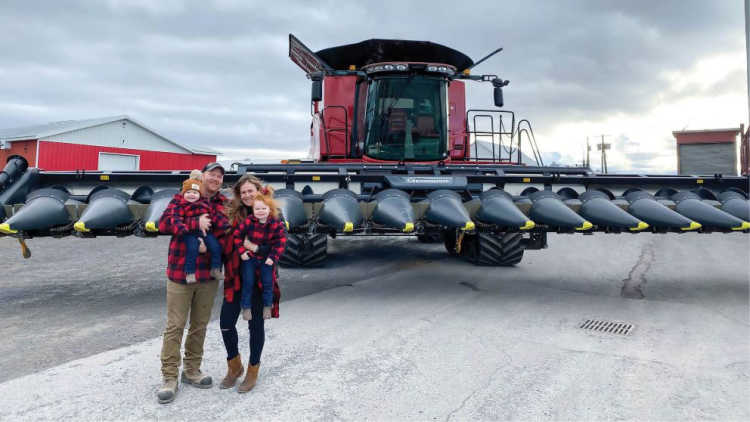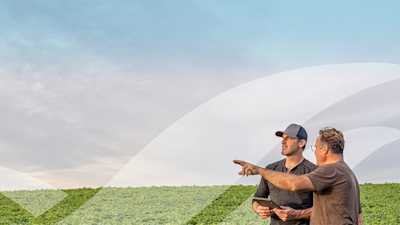Family farms transition for a powerful future

It was more than a coming together of two families when Mélissa Bourdon and Andrew Vallance got married in 2015. Their union also started the process of bringing together two family-farm businesses.
“Our families always farmed across the road from each other, but there is five years’ difference between Andrew and I, so we never knew each other growing up,” Mélissa says. “One day, we were planting side-by-side and that’s how we met – and the rest is history.”
Both were very involved in their Maxville, Ont., family farms while growing up – Andrew in dairy and cash crops, Mélissa in poultry, cash crops and her family’s commercial feed mill. They also both studied agriculture and business after high school and couldn’t see themselves doing anything else.
And they’ve been on a rapid growth trajectory ever since.
Growth begets growth – and sustainability
The couple grows corn, beans and cereal crops and raise broilers in two new barns they built on Andrew’s family farm. They also completed a transition to take over Mélissa’s family operation, which is focused on egg and broiler production and cash crops.
As well, Mélissa and Andrew are involved in the daily operations of Bourdon Feed & Grain Inc., which her father Marc started in 1991. Mélissa serves as the general manager and Andrew as manager-operator.
Ambitious plans are in their future. They’re building another broiler barn and an additional layer barn this year to add another enriched system for egg production. A new solar project has begun in an effort to ultimately be self-sufficient and produce enough energy for their own needs, and more quota and land will be purchased as the opportunity arises.
“We’re always clearing land, doing land improvement projects and looking to expand our land base,” Andrew says. “All the crops we grow are used at the feed mill; we like to be as self-sufficient as possible.”
Mélissa handles all the administration, accounting and daily feed mill operations, and both she and Andrew work in the barns and the fields. Andrew also manages operations in all aspects of their businesses and heads up their team of just over 30 employees. Although they each have individual responsibilities, they make important decisions jointly with their parents.
Building on experience
Mélissa’s father Marc is still actively involved in everyday operations, as well as serving as a board director with Egg Farmers of Ontario and Chicken Farmers of Ontario since 2016.
“Andrew and I, we absolutely love working together and we make a great team. We also work with my father and Andrew’s father Jim every day. They are both our mentors in different decisions,” Mélissa says. “From a very young age, our fathers were very encouraging in letting us do things on our own. It was very humbling for them to let us take the lead.”
Essential to helping them launch their farming careers has been the ability to build on their parents’ success and experience.
The Bourdon family farm started in 1961 when Mélissa’s grandparents Marcel and Louise Bourdon, both from dairy farming families, started their own dairy farm and years later raised their first flock of birds. Their son Marc and his wife, Lucie, who also grew up on a dairy farm, took over in 1991.

The Vallance family started farming in 1879. Andrew’s parents, James and Lee Anne, took over from his grandparents Wilfred and Donalda – and he and Mélissa are now the proud fourth generation of Vallances on the farm.
A formal process smooths transition
“Succession is a huge deal, and a lot of farm families have a hard time getting through it.”
How the farms have evolved over the decades is a source of pride for Mélissa and Andrew, as is how they’ve been able to successfully navigate their farm business transitions. Their process was a formal one involving accountants and other advisors, and after a successful transition with the Vallances, they applied the same approach with Mélissa’s family.
“Succession is a huge deal, and a lot of farm families have a hard time getting through it,” Andrew says, adding it was helpful that both families were very flexible in their approach to transition. “Our lines of communication are good, and we’re lucky to have that. In this industry, it’s one of the hardest things for farm families to get through.”
Government and community support underpin success
According to Mélissa and Andrew, another key element of their success has been the supply management system, Canada’s national agricultural policy framework used to control the supply of dairy, poultry and eggs, and the stability it offers farm families. Without it, they believe their business would look much different today.
But it hasn’t all been smooth sailing. In 2019, after less than three years in operation, one of their broiler barns burned down.
Luckily, the barn was empty at the time – the next flock of birds was due to go into the barn that day and was only 20 minutes away when the fire broke out. Mélissa and Andrew were fortunate to be able to place those birds in a neighbouring empty barn, so they didn’t incur any production losses while they were rebuilding. And the barn’s foundation had somewhat remained intact, so the rebuild was a much faster process than it would otherwise have been.
“It was pretty hard for us to see, but we had the builder out the next day to start getting us going again,” Andrew says. “We’re always very positive people and we always see there are opportunities even in difficult times, you just have to know where and how to look sometimes.”
“We’re always trying to be better at what we do and thinking ahead for the future – and we’re extremely thankful that our children can grow up living this life,” Mélissa adds. “Our priority is to keep producing a great and healthy product, be proud of what we do and show our children what we love every day.”
Lessons from the Bourdon and Vallance family farm transition include:
Tap into the expertise of seasoned farm executives while exploring and executing fresh directions with new talent.
Consider how sustainable, forward-thinking and innovative additions (enriched and animal welfare-enhanced housing, wind and solar power, etc.) might factor into your growing business.
Formalize the transition process with the help of experts to ease stress and uncertainty and move confidently into your next phase of business.
From an AgriSuccess article by Lilian Schaer.

